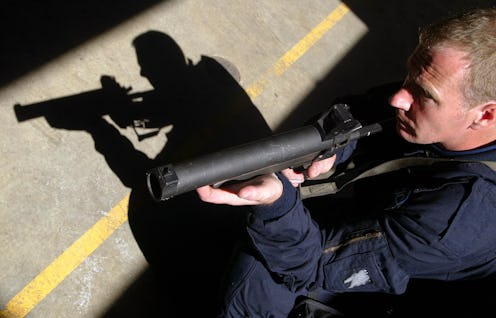News
Gun Bans To Expire Days Before Newtown Anniversary
Five days before the one-year anniversary of the mass shooting in Newtown, Conn., the federal ban on plastic and 3-D-printed guns is set to expire at midnight Monday. The deadline reveals two things: 1) that Congress has got to stop waiting until the literal last minute to pass bills, and 2) that gun control advocates still aren't getting anywhere. Congress is expected to approve a ten-year renewal of the Undetectable Firearms Act. Sounds like good news, except that this will mean those who have pushed hard for new gun-control measures over the last full year won't be able to make changes to the legislation for another decade.
The gun-control lobby had pushed to include a caveat that would require guns to have a detectable metal component so that they would be trackable, but the NRA and the House have flat-out refused.
As President Obama famously pointed out in an emotional Rose Garden speech after his post-Newtown gun-control efforts were defeated, a stricter approach to guns is supported by the majority of the public — but opposed by a small but powerful political minority. After the Newtown murders last Dec. 14, public opinion and political force tried to tackle gun violence by ensuring improving background checks and cutting down on unlicensed gun sales.
Obama spearheaded the movement, and invited several parents of the children killed at Newtown to implore for change. But 45 Senators (41 Republicans, 4 Democrats) opposed the legislation. It was a minority, but it wasn't enough to approve the bill, and an angry Obama called it "a pretty shameful day for Washington."
The Undetectable Firearms Act is pretty straightforward. It bans guns made from plastic and other materials that would make a firearm impossible to track down, thus banning your Average Joe from 3-D printing a gun — a real possibility and a federal concern, even for the GOP. The House has already voted to pass it, but don't take that to mean that they're in favor of strict gun laws: actually, the ten-year ban would mean that Democrats would have no power to amend the legislation until 2023.
Sen. Charles Schumer (D-N.Y.) suggested that it might be a good idea to legally require a metal part in all firearms, thus making it much more difficult to get away with 3-D printing guns, even as the controversial technology expands and develops over the next decade.
Nuh-uh, said the NRA. Nuh-uh, said the House. The Senate has just over 12 hours to approve the bill before it expires, so they sure haven't got a lot of time to compromise. The Senate is expected to approve the same bill cleared by the House, meaning that though 3-D printing guns will remain illegal, it'll also be easier to smuggle a plastic gun around because it won't show up in detectors. And this loophole won't get to be corrected for 10 years.
Great. Sounds perfectly safe to us.
But don't be fooled: 3-D printing is far from all bad. The developing technology has already seen a host of organs built in miniature, sparking hopes that scientists will one day be able to print organs for those in need of them. A whole bunch of space-technology firms are even investigating 3-D printing to see if it can aid space travel. The idea is that astronauts will be able to make new parts mid-flight so they won't have to carry all of the equipment with them.
Maybe that'll help stop this sort of thing, eh, Sandra Bullock?
